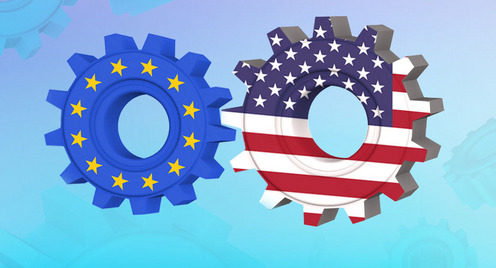We measure the degree of dependencies of the EU in its trade relations. We focus on the products needed to achieve Europe’s dual transformation ‒ decarbonisation and digitalisation. Our aim is to sharpen the awareness among policy-makers and initiate the development of strategies that help identify and reduce critical dependencies. We pay particular attention to strengthening existing multilateral organisations, e.g. the World Trade Organisation, and rules, as well as to developing new multilateral alliances and partnerships.

Montage: © Alex; 12ee12 - stock.adobe.com
A SOVEREIGN EUROPE: STRATEGIC MANAGEMENT OF GLOBAL INTERDEPENDENCE
Our Focus
ANALYSIS OF CRITICAL DEPENDENCIES
PARTNER, COMPETITOR, RIVAL: CHINA AS A CHALLENGE FOR THE EU
The EU has greatly benefited from China’s economic rise. Yet meanwhile the challenges are increasingly threatening to outweigh the opportunities that come with it. China is becoming more and more aggressive internationally and is using economic dependencies more purposefully to achieve political goals. In the future, the EU must, therefore, manage the difficult task of reducing critical dependencies on China while keeping channels open for cooperation in certain key areas, such as climate change. Moreover, Europe must ensure that its own interests are sufficiently safeguarded in the practice of relations between the two superpowers, the US and China. This requires, on the one hand, the EU to act much more as a unit. On the other hand, it must more strongly diversify its external relations. It ought to place a particular focus on the Asia-Pacific region. The aim of this module, therefore, is to work together with partners from politics, business and think tanks to (further) develop and implement a coherent EU strategy with regard to China and the Asia-Pacific region.
TRANSATLANTIC FORESIGHT LAB
The USA is still Europe’s most important economic partner and ally with a common foundation of values, yet partly different interests and geopolitical perspectives. Europe needs the US as a partner in the multilateral environment, but it must also be able to defend its values and interests in the world on its own.
The aim of this module, jointly conducted with the Bertelsmann Foundation North America, is to provide impetus and concrete policy proposals to develop and implement new transatlantic approaches to deal with critical dependencies.
The Transatlantic Foresight Lab follows a dual approach: A Transatlantic Expert Group consisting of representatives from think tanks, academia and business on both sides of the Atlantic analyses ongoing political processes, such as the EU-US Trade and Technology Council, and economic interdependencies. On this basis, it develops policy proposals for action. The expert group is flanked by the crowdsourced forecasting platform RANGE (Rethinking Assumptions in a New Geopolitical Environment), which provides forecasts on key issues in transatlantic relations.
POLICY OPTIONS FOR THE EU NEIGHBOURHOOD
The 23 countries that have so far been in the focus of the European Union’s neighbourhood and enlargement policy considerably differ in terms of their level of political and economic development. Nevertheless, in socio-economic terms they are closely linked to Europe. This is illustrated by the high degree of economic interdependence between the EU and its neighbouring states. However, China and Russia are trying to extend their influence and undermine the EU’s interests in a peaceful and democratic development of this region.
In our project work we aim at identifying options for strengthening the interdependence between the EU and its neighbouring states in strategically relevant areas ‒ food security, supply chains, future technologies, critical raw materials, infrastructure ‒ and to shape it in such a way that the region can modernise itself together with the EU and prosperity and stability increase in line with the EU’s value orientation.
Moscow’s willingness unilaterally to break the European peace order, as recently massively demonstrated in Ukraine, and its use of export restrictions and trade embargoes to create zones of limited sovereignty in the EU neighbourhood have fundamentally changed the challenges for the EU. Thus, for the EU, defending its own sovereignty will have to involve both strategic management of its external economic relations with China and Russia and active participation in shaping the potential of its neighbourhood. In doing so, it is important to put partnership in the relationship with the neighbourhood in the foreground and to be able to control the crisis potential in the long term even without US assistance.











